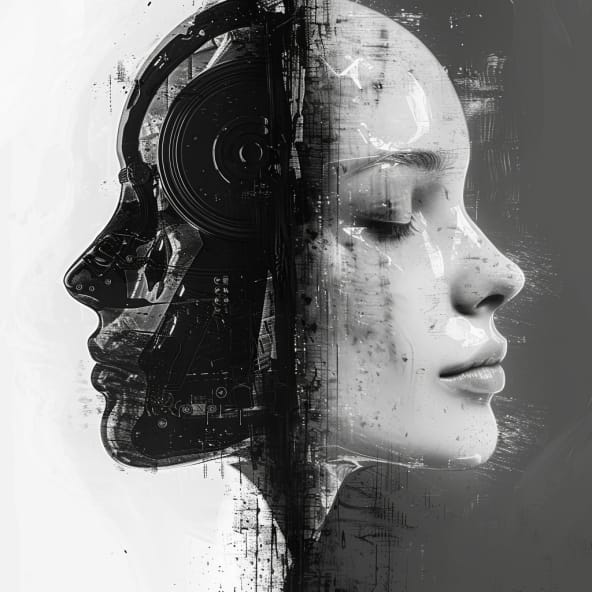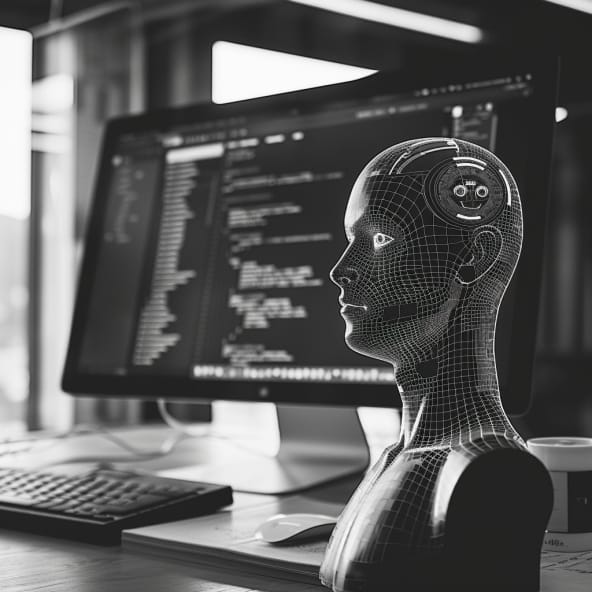- AI Trailblazers
- Posts
- Navigating AI: This Week's Business Highlights #8
Navigating AI: This Week's Business Highlights #8

Welcome to the AI Trailblazers Newsletter. We are also delighted to share more details of the AI Trailblazers Summit, taking place on June 6th, 2024, at NeueHouse in Madison Square, New York. We are partnering with Amazon Web Services to bring you exclusive programming. Scroll down for a list of confirmed speakers and secure your seat to avoid missing this opportunity to engage in insightful discussions about the future of AI in business and to network with fellow trailblazers.
Will Digital Twins Replace Human Jobs?

The WSJ explores the use of AI-generated entities to fulfill human roles. Referred to as digital twins, these AI systems are reshaping industries by analyzing individual characteristics and predicting behaviors. As companies delve into the potential of AI-driven personalization and efficiency, questions arise regarding the future of human employment and the ethical implications of this technological advancement.
AI Revolutionizing Various Sectors: Artificial intelligence is transforming industries by replacing humans in tasks such as modeling clothes, participating in focus groups, and even serving as digital representations in clinical trials. These AI systems analyze individual data to predict behaviors, appearances, and responses, offering a glimpse into a potential future where AI twins are ubiquitous.
Applications Across Different Fields: Startups like AI Fashion, Brox AI, and Unlearn are pioneering AI applications in fashion, market research, and healthcare respectively. AI Fashion generates AI images of models wearing various clothing items, while Brox AI facilitates digital focus groups based on extensive individual data. Unlearn, on the other hand, creates digital twins based on health data to predict disease progression in clinical trials.
Ethical Considerations: Despite the potential benefits, the widespread adoption of AI-generated personas raises ethical concerns and challenges. Gartner highlights the importance of handling data, terminology, and consumer perceptions carefully. Furthermore, there are concerns about the impact on human workers, particularly in industries like modeling where AI-generated models could potentially replace real ones.
Future Outlook: Companies see significant potential in AI-driven personalization and cost efficiency. Gartner predicts the widespread adoption of digital twins for customers within the next decade. However, there are still obstacles to overcome, including consumer acceptance, regulatory considerations, and the need for further technological advancement to fully eliminate the need for placebo groups in clinical trials.
AI Trailblazer Takeaways: Digital twinning will no doubt be a hot topic for years to come. The technology holds a lot of promise and practical applications across many industries, but as the article points out, will humans accept them. Eventually, they will change the roles that humans play in the workplace.
Google's Algorithmic Shift Sparks Debate

Casey Newton's article, "Google’s broken link to the web," sheds light on the transformative shift underway in the realm of online search, as Sundar Pichai unveils Google's latest advancements in artificial intelligence at the Google I/O event. While Pichai's keynote promises new opportunities facilitated by generative AI, Newton highlights the implications of Google's evolving search engine for both users and web publishers.
Google's AI-Powered Search Overhaul: Sundar Pichai's keynote at Google I/O showcased the rise of generative artificial intelligence, promising new opportunities for creators, developers, and startups. However, while Google's AI-driven products offer real-life improvements, its core search engine is undergoing significant changes. The company's shift towards delivering more answers within its platform raises concerns about the future of the human-powered web and its reliance on traffic from search engines.
Impact on Web Publishers: Google's introduction of AI-powered search results, known as Search Generative Experience (SGE), signals a profound shift in how information is accessed on the web. Publishers anticipate a significant decline in traffic as AI overviews potentially obscure traditional search results, posing financial challenges for content creators and advertisers. Analysts predict a substantial decrease in web traffic, with estimates ranging from 10 to 25 percent by 2026, highlighting the potential economic repercussions of Google's AI-driven approach.
Challenges and Responses: As Google navigates the transition to AI-enhanced search, concerns arise about the company's dominance in the digital advertising market and its impact on web ecosystems. While Pichai downplays potential disruptions, emphasizing overall usage growth, publishers brace for substantial losses. Google's ability to control when AI overviews are displayed and its vast array of revenue streams provide some reassurance, but the broader implications for web discovery and content dissemination remain uncertain, prompting individuals and businesses reliant on web traffic to seek alternative strategies.
AI Trailblazer Takeaways: There is no doubt that search engines will and have changed with the introduction of Generative AI. From a consumer point of view, search has become much more robust and less time consuming, but what about publishers and brands that depend on SEO to drive traffic to their properties? Will this mean less people coming to their site to find the information they’re looking for. Moreover, is Google biting the hand that’s feeding them. They don’t think so…but time will tell.
Expedia Unveils Romie: AI-Powered Agent

In a bid to revolutionize the travel planning experience, Expedia is embarking on an AI-powered journey with the introduction of Romie, an innovative virtual assistant set to redefine how users search, plan, and navigate their trips.
Expedia's AI-Powered Features Introduction: Expedia announces the launch of an AI assistant named Romie to enhance travel planning experiences, including search, itinerary building, and real-time updates like flight delays. Romie, trained on a combination of in-house and OpenAI models, operates within iMessage and WhatsApp, leveraging ChatGPT to assist users with tasks such as summarizing itineraries and suggesting restaurants. Expedia also introduces smart search functionality on its website, allowing users to describe their hotel preferences instead of using filters, thereby enhancing the search experience.
Integration of AI Across Expedia's Services: Expedia integrates AI into its core features, pulling data from sources like AccuWeather and Yelp Network to personalize search results and provide real-time updates to travelers. Romie assists users by suggesting hotels based on specified preferences and can also provide recommendations for nearby accommodations in case of flight cancellations. Expedia's AI initiatives aim to streamline the travel planning process and provide users with proactive assistance throughout their journey.
Competition and Market Trends: Expedia's move into AI-powered travel planning follows similar initiatives from competitors like Booking.com, Airbnb, and Kayak, who have introduced AI-driven features to enhance the user experience. Startups like Mindtrip, Pilot, and Layla are also leveraging AI to compete with established travel platforms, offering innovative solutions for personalized trip recommendations and social travel planning. Despite competition, Expedia remains confident in its AI assistant's multi-functionality and its ability to provide comprehensive support across various channels, including messaging platforms like iMessage and WhatsApp.
AI Trailblazer Takeaways: Some people love to plan their trips. Romie is not for them. But some find the whole thing arduous and will welcome Romie with open arms. Expedia has clearly identified how AI can assist their customers in making the trip planning process more enjoyable and less stressful. Expect to see more developments in this direction as Romie evolves into even more of an AI Agent. Bravo Expedia!
AI Trailblazers Summit Details
Join us for our AI Trailblazers Summit on June 6th at the stunning Neuehouse in Madison Square, New York. This meticulously curated forum will delve into the critical questions shaping marketing, product development, innovation, legal frameworks, and venture capital in the AI era
Speakers include:
Bob Lord, former SVP of Cognitive Applications at IBM
Dave Lampert, Cadwalader LLP
Jonathan Halvorson, SVP Consumer Engagement, Mondelez
Karen Levy, CIO, Debevoise & Plimpton
Marisa Thalberg, CMO, United Parks
Peter Lesser, CIO, Skadden Arps
Sara Fischer, Journalist, Axios
Sophie Kelly, President of Tequila Brands at Diageo
Suzanne Vranica, Journalist, The Wall Street Journal
More speakers and the agenda will be announced in the coming days. Don’t miss the opportunity and reserve your seat now.
New Members & Guests: Purchase a ticket
Members & Corporate Leaders: Request an invite
What is AI Trailblazers?
AI Trailblazers is a vibrant platform dedicated to uniting marketers, technologists, entrepreneurs, and venture capitalists at the forefront of artificial intelligence (AI).

Photographs from the AI Trailblazers evening at SXSW
We launched at CES in partnership with The New York Times and hosted our members for an evening of AI programming at SXSW. AI Trailblazers is designed to fuel growth, innovation, and career development among its members, who all want to be at the forefront of incorporating artificial intelligence into their businesses and their lives for strategic advantage. More information here.
Quote of the Week
“It is customary to offer a grain of comfort, in the form of a statement that some peculiarly human characteristic could never be imitated by a machine. I cannot offer any such comfort, for I believe that no such bounds can be set.”
—Alan Turing, 1951
Magnificent 7 Links
OpenAI Develops AI Voice Assistant as it Chases Google, Apple (The Information)
Web publishers brace for carnage as Google adds AI answers (Washington Post)
Google I/O 2024: An I/O for a new generation (Google Blog)
Other Links of the Week
The Forrester Wave™: AI Services, Q2 2024 (Forrester)